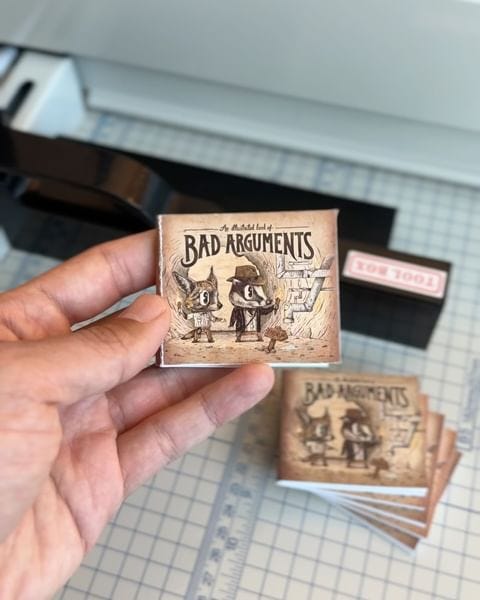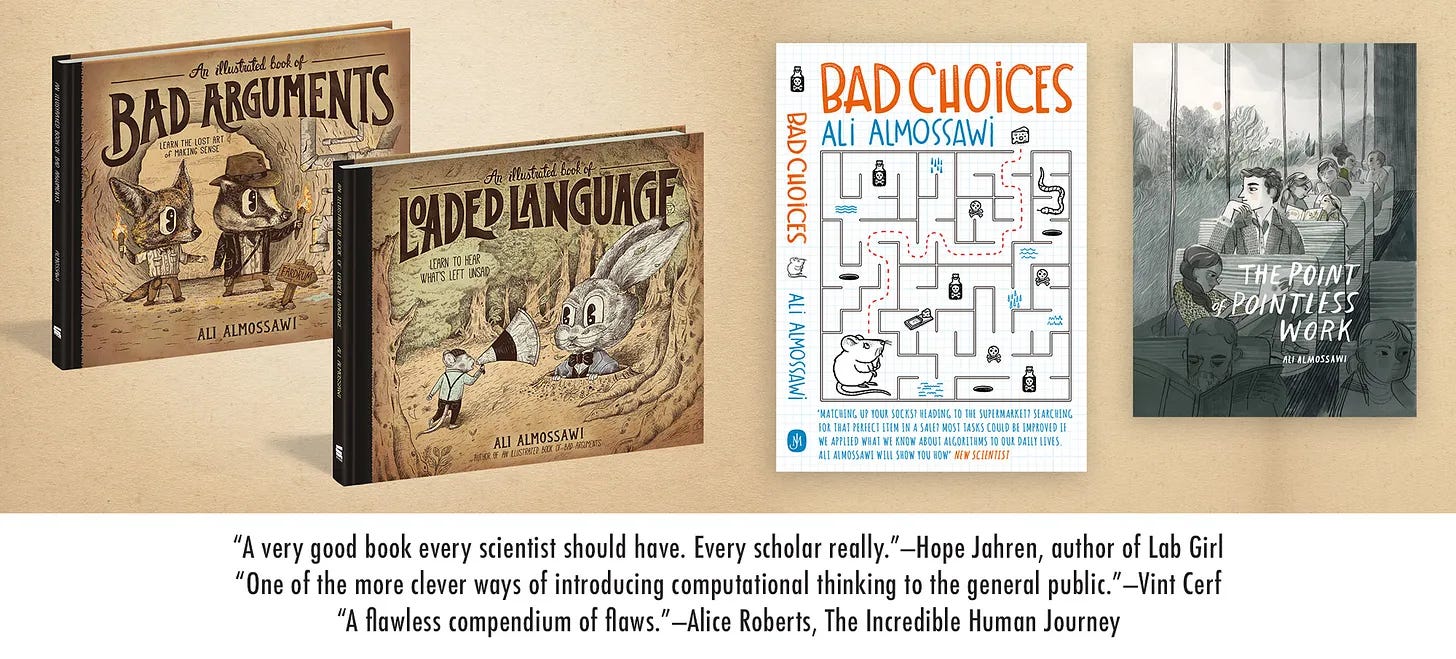The Fields Medal Winner Who Thought He Was a Slow Learner
Plus, paper guillotines and corner rounders, mystery dinners, and contronyms in different languages
Issue No. 31
Hello, friends. This issue was supposed to be on how to use a little Excel add-in called Solver to help match people. I’d volunteered to organize this thing called Mystery Dinners a couple of years ago. People show up for dinner at other people’s homes—guests don’t know where they’re headed till the last minute and the families hosting don’t know who’ll show up.
The idea is to get people to break out of their cliques and sit down with people they wouldn’t otherwise mix with over dinner.
Rather than do the matching process by hand, I’d used Excel’s Solver back then to model who should go where. And I thought it would be nice to give a walkthrough of that and share the model with you all, since we’re often faced with that type of problem in life, I feel, where we’re trying to optimize something given a set of variables and constraints.
But hard as I tried, I couldn’t simplify my explanations enough. And rather than burden you with a dry, technical treatise, I’ll postpone that topic for now and maybe try again in a future issue.
All of which is to say I was left with about a day (yesterday and then a bit of this morning) to write this issue. I hope you don’t mind that things might be a bit off-the-cuff, a bit more informal, this week.1 Needless to say, there won’t be any prizes for spotting typos!
1 A mind like a freight train
For a few years now, I’ve been mentoring college students in various capacities. One thing I sometimes pick up on is the feeling of inadequacy that comes from a person thinking they’re slow at learning, or slower than others around them at the very least.
Sometimes it’s imposter syndrome, borne of too much pressure to perform in adolescence perhaps, or forced precociousness in childhood maybe. Sometimes it’s actual precociousness. Sometimes it’s hyperactivity that makes a person interested in a lot of things and so they never quite feel they’ve mastered any one thing. Sometimes it’s early success, that notoriously lousy teacher to borrow a phrase.2
Whatever it is, the effect is a doubting of one’s own abilities.
And so in those chats with students, I like to bring up examples of people who made it in life, despite not being natural savants. “Made it” in the sense that they had a lasting impact on at least one other person in this world before they left it.
I want to share two passages about two people today. I think you’ll like them. The first one is from a professor reminiscing about his days in graduate school.
I particularly enjoyed Frank Raymond's lectures. He had a mind like a freight train. It took so long to pull out of the station that you’d think he was stupid. His heavy-lidded eyes only added to the effect. But he would gradually speed up, becoming unstoppable once up to speed. Raymond would draw an exact sequence on the board or a commutative diagram and a student might ask, “How do you know the mapping on the right is onto?” Raymond would blink, as though he'd never heard of an exact sequence.
He’d hem and haw, pull out a typical element of the mapped-into set, examine it, slowly derive its basic property, one that would ensure it was an image element, then go on to derive a similar property for all the sets of the diagram, then he would lift the entire commutative diagram into a covering space and derive some exotic property of the space itself, all from an innocent question. Every question, even a stupid one, was well-repayed (sic) in Raymond’s classes.
—A. K. Dewdney, Deductive and Inductive Science: Reflections, Memories, & Open Problems
Have you met people like that? I sure have come across several throughout my life. They’re slow burners. At first you underestimate them, you might even ignore them. And then, in time, they demonstrate an unmatched level of mastery and ingeniousness, presumably out of nowhere.
My first time coming to terms with this blindspot was enough to teach me to seek the quiet ones any time I was in a new group or at a conference. To seek that person off in the corner by themselves. Not everyone can make a splashy first impression, and I think it’s important to be cognizant of that in our relationships and in life-altering decision-making processes like who we hire or who we partner with.
Here’s the second passage, from a Fields Medal winner no less.
In spite of my success, I was always deeply uncertain about my own intellectual capacity; I thought I was unintelligent. And it is true that I was, and still am, rather slow. I need time to seize things because I always need to understand them fully. Towards the end of the eleventh grade, I secretly thought of myself as stupid. Even when I was the first to answer the teacher’s questions, I knew it was because they happened to be questions to which I already knew the answer.
—Laurent Schwartz (A Mathematician Grappling with His Century)
So you see, it is possible to be slow and to win your discipline’s highest prize. Not everyone needs to be cut from the exact same cloth or adopt the exact same means or mode of thinking to be of value to others.
Sometimes it’s slowness that leaves us feeling like outsiders or makes others see us as such, and sometimes it’s an unconventional approach to learning or to teaching. In The Strangest Man, we have this passage about a professor who did things his way and was chastised by his contemporaries as a result.
[Oliver Heaviside was an acid-tongued recluse whose approach to teaching the mathematics of engineering was a pragmatic one.] No one quite understood why [his] methods worked, but he didn’t care: what mattered to him was that they gave correct results, with a speed more rigorous methods could not match and without generating inconsistencies with other parts of mathematics.
Engineers prized Heaviside’s methods for their usefulness, but mathematicians mocked them for their lack of rigour. Heaviside had no time for pedantry (‘Shall I refuse my dinner because I do not understand digestion?’) and rejected the attacks of his detested opponents.
—Graham Farmelo (The Strangest Man)
Sometimes, you have to let pedantry get off at the next stop and drive that bus at full throttle.
Did he take it to heart? Did he do a guitar solo about how much it hurt to be ostracized, like I definitely would have had it happened to me? No. Apparently, he wrote his autobiography and entitled it after his many critics.
Wicked People I Have Known
Nice, Oliver. Very nice.
A friend once told me we all have that nagging voice inside us. The most important thing to do any time we hear it is to ask ourselves if what it’s telling us is helpful or if what it’s telling us is unhelpful. And when it’s unhelpful, it’s best to learn how to ignore it.
(Any other examples you’ve come across? Feel free to share them.)
Short on time and want to read more books? I recently used Shortform to quickly catch up on a book for a book club. Shortform offers in-depth book summaries for over 1,000 non-fiction titles, chapter-by-chapter breakdowns, along with interactive exercises and audio options, so you can keep learning while you’re on the go.
Shortform is offering readers of The Critical Thinker a free trial + 20% off an annual subscription. ✨ Claim your free trial
✨ This is a sponsored post. A big thank-you to this newsletter’s sponsors for their generous support. Want to feature your product here? Email 💌 press@almossawi.com.
2 Contronyms in different languages
Several of you wrote to me after last week’s issue on contronyms in the English language—contronyms being words that have opposite meanings. Some of you shared that you’d seen contronyms in other languages too. Thank you for opening my eyes to that. I really enjoy learning from you all and I’m always grateful for these interactions.
Here are a few I thought I’d share.
In Japanese, the word 適当 (tekitou) can mean
Appropriate, suitable, or proper
or it can mean
Sloppy, careless, or irresponsible
The word いい加減 (iikagen) can mean
Reasonable, moderate, or appropriate
Or it can mean
Irresponsible, half-hearted, or lazy
Thank you, Nate!
In German, the word aufheben can mean
To cancel or abolish
Or it can mean
To keep or preserve
The word übersehen can mean
To overlook or miss something
Or it can mean
To comprehend or survey something clearly
Thanks, Thomas!
In Spanish, the word claro can mean
Clear or obvious
Or it can mean
Pale or faint
A topic for another time, but I had the most fascinating conversation with a barber who told me about how words in different dialects of Spanish can mean very different things, which, as you might imagine, can lead to awkward social situations.
3 Tiny books and round corners
I mentioned a few issues back that I bought a paper guillotine and was planning on using it with the tiny books I’ll be sending some of you in about a week. It’s glorious. It just makes things so much easier and the result much more polished. Here’s a video that compares the prototype I made back in July and these new ones trimmed with the guillotine. The video of it in action (the second one once you click through) is quite pleasing to watch.
I used the door-thing it comes with to clamp the books overnight after sewing and gluing them, rather than putting them under heavy books like last time. The spine ended up being 2 mm thinner and feels much sturdier.
I also ordered a corner rounder. A corner rounder basically, well, rounds corners for you. The clue’s in the name I suppose. This particular one can do roughly 0.75 inches of 80 lb paper in one go. I figured it would be fun to buy card stock from the local art supplies store and make custom postcards instead of buying something ready-made.
~
Here’s the finished product ready to ship first thing next week. I was thinking of making a journal next, possibly bound in faux-leather or something similar, and seeing how that ends up looking.
I feel there will always be a space in the world for analog things. I certainly feel like no app in the world could take the place of a good pen or a well-crafted notebook.

There is something at work in my soul, which I do not understand.
—Mary Shelley (Frankenstein)
Until next time.
Be well,
Ali
P.S. I’m excited that the new seasons of Silo and Bad Sisters are out.
Then again, Substack’s analytics show that whenever I’m informal and don’t overthink a topic, the issues tend to get more views.
“Early success is a terrible teacher. You’re essentially being rewarded for a lack of preparation, so when you find yourself in a situation where you must prepare, you can’t do it. You don’t know how.” ― Chris Hadfield, An Astronaut’s Guide to Life on Earth








- This reminds me that the Germans have an admiration for someone with sitzfleisch, the ability to sit down and work through a time consuming task or problem.
- Learning grade school math isn't so much about the mathematics as learning that some things can take more than 30 seconds to solve.
- Heaviside was an example of an outsider making serious contributions in science and mathematics. He had no formal training when he published seminal work on electromagnetic theory in a popular telegraphy magazine. He was following in Euler's fine tradition of ignoring the rigorous niceties. .